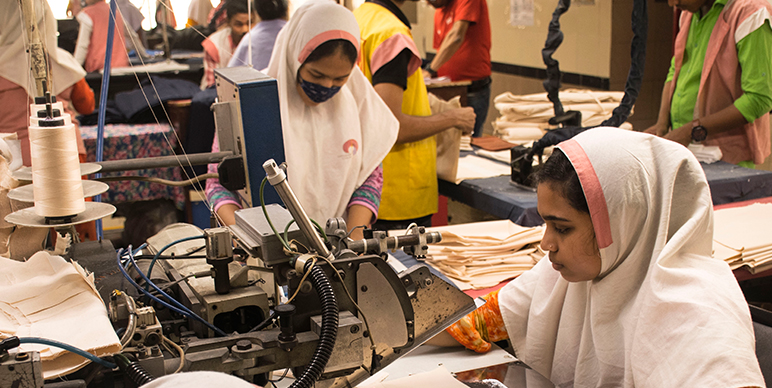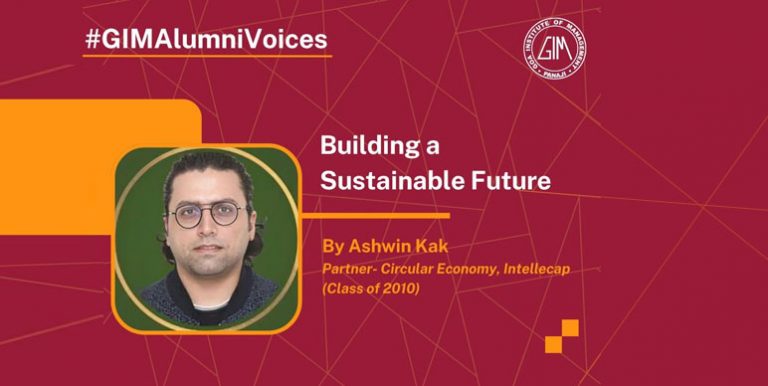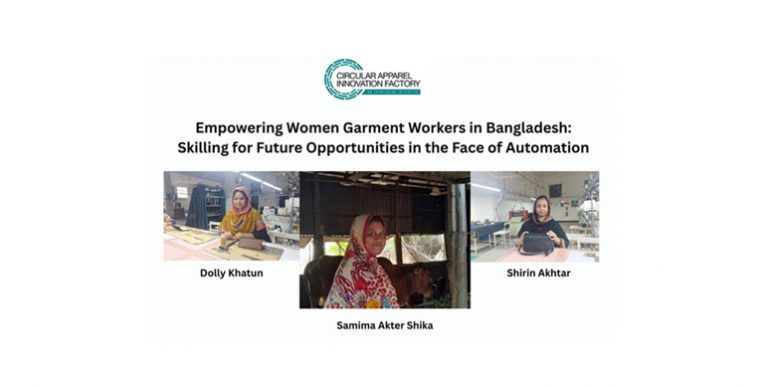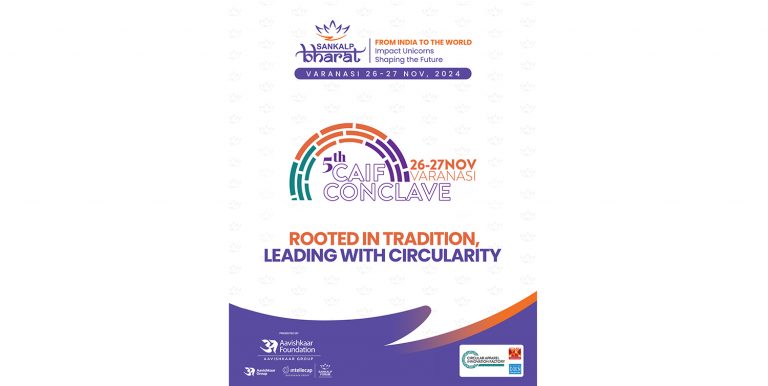5 key notes to orchestrate the next wave of growth in Bangladesh’s RMG sector – by Ashok Kumar Thanikonda, Manager, CAIF
Bangladesh’s Ready-Made Garment (RMG) sector is a significant contributor to the country’s economy, accounting for over 80% of the country’s export earnings . The sector faces various sustainability challenges at present, including water and energy consumption and efficiency, pollution, and hazardous working conditions. Graduation to a middle-income economy status also negates the preferential export partner status of Bangladesh with the European Union and USA. Hence it is pertinent for the sector to reinvent itself through the ESG compliance and competitiveness compared to its rising peers in Southeast Asia.
However, Micro Small and Medium Enterprises (MSMEs), which account for a greater share of the RMG sector, often lack the technical knowhow and/or financial credibility to transition to a green and sustainable future. For example, they are 10-15% inefficient in energy consumption compared to the larger RMG players.
What does it take to accelerate the green transition of MSMEs in Bangladesh’s RMG sector?
Experts from various organizations deliberated on this pertinent question during the inaugural Sankalp Dhaka Summit organized on 19th March 2023 by Circular Apparel Innovation Factory (CAIF), an initiative seeded by Intellecap, a leading impact investment and consultancy firm. The following critical insights emerged from the discussion:
-
Collaboration among stakeholders is critical as highlighted by Ms. Chowdhury from the International Finance Corporation (IFC) being the reason for IFC’s PaCT program’s success in supporting over 130 factories in Bangladesh to become more resource-efficient and adopt sustainable practices.
Intellecap’s experience indicates that the cost of transitioning the RMG sector to a green and circular future far outweighs the benefits. However, not all stakeholders can afford to absorb this cost equally – especially the MSMEs. Hence, all the stakeholders must collaborate to better understand the systemic costs of transition to circularity (and cost of inaction) and use the matrix of pricing, performance mandates and capacity targets, and penalties/ incentives to clarify who pays for it. Mujib Climate Prosperity Plan estimates that government spending, carbon taxation on large businesses, and payment guarantees by the government to unlock private sector investments will cover about half of the finance required for climate proofing Bangladesh. This puts the onus to act on the brands, large manufacturers, DFIs, and government.
-
Circular design principles to reduce waste, reuse and recycle resources, and regenerate natural systems need to be incorporated into the business models as emphasized by Mr. Real from H&M. H&M is committed to achieving 25% circularity in materials and 50% GHG reductions by 2030.
Intellecap, H&M and UNIDO are working towards ramping up the indigenous recycling ecosystem to meet the evolving circularity aspirations in Bangladesh. The partnership under UNIDO’s global SWITCH2CE program, is working with many global innovators on bringing them to Bangladesh and localizing their technologies for blended waste recycling in Bangladesh at the design stage itself.
-
Conducive policy framework is required to encourage and provide enabling support to entrepreneurs to scale up textile recycling in the country, according to Mr. Munir from CYCLO Recycled Fibers.
Intellecap’s experience with deploying innovations to recycle blended textile waste and developing ethical waste collection and recycling supply chains in Bangladesh reinforces this insight. Bangladesh needs to develop local capacities and capabilities to incorporate and internalise circular design principles in its manufacturing supply chains. The National Productivity Master Plan identifies the lack of government’s incentives, investment in R&D to boost diversification as one of contributing factors to the low productivity. At the policy level, sharpening of the generic waste management and resource efficiency policy provisions, and re-casting through a specific focus on circularity in RMG sector, could help Bangladesh recycle 3,00,000 tons of pure cotton waste, cotton components from another 3,00,000 tons of blended waste and 1,00,000 tons of polyester every year.
Mr Zaki Zaman, the Country Representative of UNIDO, mentioned that Bangladesh can save $500 million from recycling cotton and plastic waste streams within the country, and decrease import dependency as well.
On the energy front, operationalizing the open access PPA models as outlined in the “Policy Guidelines Enhancement of Private Participation in the Power Sector 2008” can scale up grid-connected renewable energy (RE) capacity; and help Bangladesh achieve its RE generation targets of 10% and 40% by 2021 and 2030 respectively. Open access mechanisms are also critical to introduce competition into the power sector, provide clean energy procurement options to those interested in decarbonizing their value chains, and exploit grid’s transmission potential to connect generation with demand.
-
Customized financing aimed at the MSMEs, Mr. Haque from The City Bank Limited said, can promote sustainable practices in the RMG sector.
Primary beneficiaries of the $300 million from Japanese International Co-operation Agency (JICA), $100 million from French Developmental Agency (AFD), and $ 256 million from the Green Climate Fund (GCF) lending for various sustainability initiatives in Bangladesh, are large manufacturers. Hence, government owned Infrastructure Development Company Limited (IDCOL) worked with KfW on Euro 50 million equivalent funding to Bangladesh with a strict request for the fund to be routed to the MSMEs. The government has also initiated a Taka 25,000 Crore (Euro 2,125 million) refinance scheme for SMEs with borrowing costs as low as 2%. More such programs, designed with intent to build a green and resilient MSME ecosystem is the need of the hour.
-
Capacity building has emerged as a critical underlying factor throughout the discussion.
Large scale TVET programs for skilling, upskilling and reskilling of workforce for the RMG sector are needed to diversify Bangladesh’s product offerings green and competitive.The government needs to increase spending, galvanize efforts of all stakeholders through public-private partnerships, design industry-oriented curriculum, and seek the support of bilateral/ multilateral initiatives with its top export destination countries like European countries, USA, Canada etc., to scale up these skilling efforts. Garment Accessories and Packaging (GAP) units which are mostly MSMEs, for example, are critical for backward integration of the RMG sector and product diversification. Bangladesh Garments Accessories & Packaging Manufacturers & Exporters Association (BGAPMEA) has proposed a National Institute of Packaging & Accessories (NIPA) in Bangladesh based on a feasibility study undertaken by the European University of Bangladesh under the EU-INSPIRED project. BGAPMEA is trying to accelerate the setting up of NIPA to deliver customized curriculum-based pedagogy in partnership with the Government of Bangladesh. More such efforts need to bear fruit.
In conclusion, the panellists highlighted the importance of collaboration and a holistic approach to aid MSME green transition in Bangladesh’s RMG sector. The insights shared by the panellists provide a clear roadmap and can serve as a valuable resource for stakeholders working towards a sustainable future for the sector. Building on these key takeaways, Intellecap through its Circular Apparel Innovation Factory, will work closely with all stakeholders in Bangladesh to help the local RMG sector and its MSMEs accelerate their green transition.








